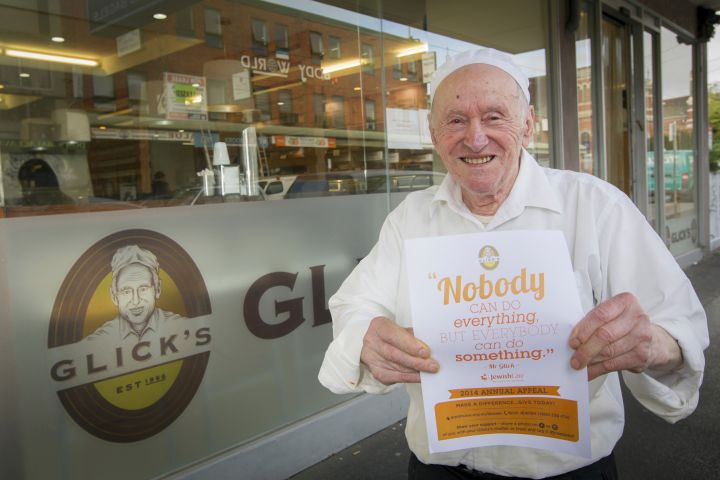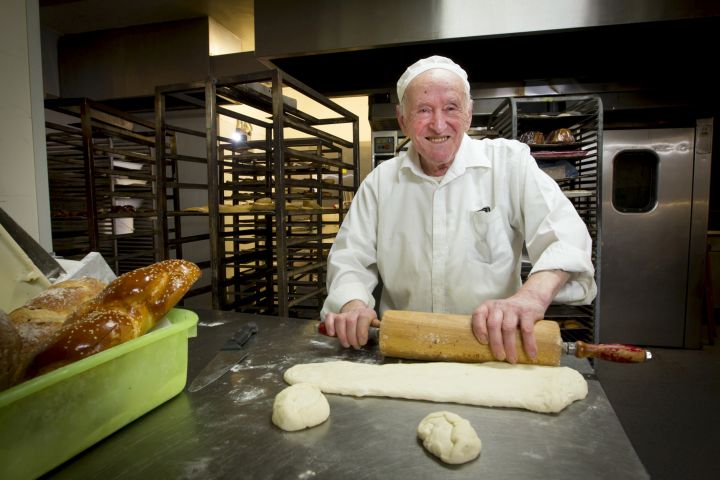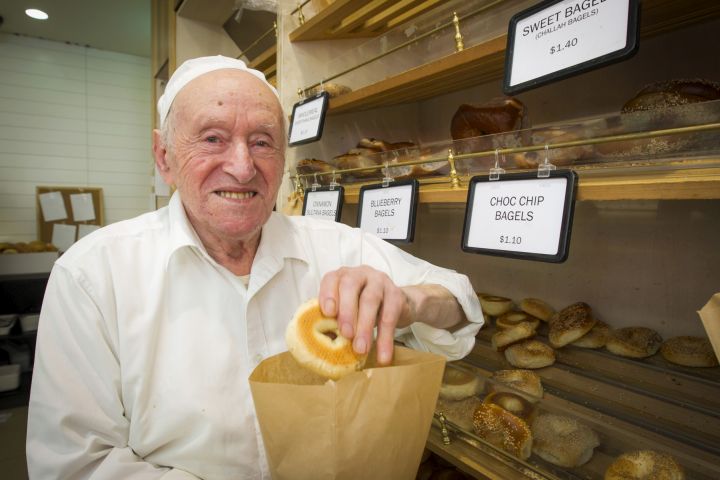23 March 2015
by Sarah Bendetsky
Each time I walk into the Glick’s shop on Carlisle St, I wonder if Mr Mendel Glick is around. He is. Dressed in a white shirt and a white yarmulke, he is always busy – shaping another challah loaf or removing bones from herring – like a jeweller faceting a diamond.
The iconic Melbourne baker and the founder of the Glick’s Cakes & Bagels chain is over 90 years old.
He left behind six concentration camps including Auschwitz and Buchenwald. He lost both parents and 9 siblings. He barely survived. Yet, despite these unbearable personal tragedies, Mr Glick managed to start a new life in Australia and recreate his own dynasty with his wife Chaya.
A proud father of 9 and a grandfather of over 120 grandchildren and great-grandchildren, he continues to bake the best bagels in town, while inspiring everyone around him.
We sit inside Carlisle St Glick’s Café on a warm autumn afternoon. Mr Glick looks out the window for a minute. He looks at passers-by and trams, Yeshivah students and young mothers with prams… He concentrates. And then he starts his story.

The very fact that we are able to talk in this café today is a pure miracle, – Mr Glick says. – I wasn’t meant to survive in Buchenwald. There, we slept in barracks on the floor, 300 people or more, without any pillows or blankets… Once, I woke up from terrible pain caused by a strange insect bite. My leg got very swollen, so I decided to see a doctor, whose office was located just a few doors away from the double crematorium, which never stopped working. It didn’t scare me. In fact, it didn’t scare anyone at that stage.
There were quite a few people before me in line to be checked. I begged G-d to make time go quicker. The pain was getting worse. Suddenly, when just one patient was in front of me, two German security soldiers entered the building to pick up the doctor – it was time for lunch. Before leaving his office, the doctor said that he was going to come back in half an hour, and therefore, we should wait.
I decided to stay. The other patient asked me what my issue was. I showed him my swollen leg. Then he said that there was no point in wasting my time and I should rather go back and walk more since walking helps reduce swelling.
I nodded without the intention to go back. Instead, I decided to walk around the building while waiting for the doctor to return. I walked and walked, when suddenly I saw a twenty-centimetre gap in the fence revealing the doctor’s office backyard. A trolley full of corpses stood next to the backdoor, metres away from thecrematorium.

I quickly understood what was going on and hobbled back into the barracks. Later on, I found out that very doctor used one treatment against all illnesses – a deadly needle killing a person within seconds. Then I realised how much G-d loves me.
When the Americans liberated Buchenwald in 1945, I was a living skeleton, just like everyone else. I still remember an American soldier picking me up and taking me outside. I couldn’t walk on my own.
While in the hospital, I wasn’t allowed food to avoid sudden death from overeating. Just a tablespoon of warm water every half hour and a lump of sugar was all I could eat. I still remember its taste in my mouth. Slowly, as I began to recover, my doctor said that in order to speed up the process I had to start walking, since the human body requires motion in order to survive. I listened to him and adapted this attitude to this day.
Where did you go after the war ended?
I started to work at the American military base not far away from Buchenwald. I cleaned their bedrooms, polished their shoes, and then I was “promoted” to work in the kitchen, which I liked most. In a way, it reminded me of our home in Poland, where my parents had their own dairy business and made cheese… (Mr Glick sighs as he remembers) Memories, memories… Working at the military kitchen helped me to learn the basics of the catering business I applied in future. It was a useful experience.
Why did you decide to move to Australia?
After the end of the war, every survivor was obliged to publish his contact details in local newspapers, and I did so, too. Later on, these details were published worldwide. I had an aunt in Australia, who moved here before the war and she managed to find me and sent me the entrance papers. Then I bought the ticket and set out on the journey.
Once in Melbourne, did you open your bakery straight away?
Not at all; it was a dream I cherished but I had no money to make it happen. So, I became a cleaner setting money aside to start my business. And a few years later I finally opened my first Glick’s shop on Carlisle Street, where we are sitting right now. Other shops followed… My kids are managing those today. I prefer this shop.
You’ve become synonymous with this quote: “Nobody can do everything, but everybody can do something.” These very words became the slogan of Jewish Care’s 2014 Annual Appeal. Why do you think it’s important to assist those less fortunate?
I guess, it’s in the blood. Back in Poland, my mother always gave her dairy products to the poor free of charge. I was a baby but I clearly remember that it was the right thing to do. It stayed with me for the rest of my life. And today, no matter how advanced the world is, there are still many people who need assistance, be it money, a piece of bread, or a kind word. Even if it’s impossible to answer every person’s need, we can all still do something to improve someone’s life. And this is the message I wanted to pass on, hence, it’s written on Glick’s bags.
Some people say that you never go on holidays. Is that true?
Yes, it is, — answers Mr Glick with a smile. – Why would I? I have the job I love. And I have regular time to rest on Shabbos and Yom Tov. What can I say, I am a happy man!
